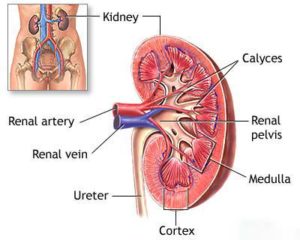Your kidneys—two bean-shaped organs located in your lower back—are your body’s filtration system, cleaning  wastes and extra fluids from your body and producing and balancing chemicals that are necessary for your body to function.
wastes and extra fluids from your body and producing and balancing chemicals that are necessary for your body to function.
Healthy kidneys also:
- Clean and filter your blood
- Produce urine
- Produce hormones
- Control blood pressure
- Keep bones strong
Kidney disease can be found through lab tests or by symptoms. High blood levels of creatinine and urea nitrogen (BUN) or high levels of protein in your urine suggest kidney disease. Diabetics should have a yearly urine test for microalbumin, small amounts of protein that don't show up on standard urine protein test.
Following a kidney-friendly diet, managing health conditions such as diabetes and hypertension and not smoking may help your kidneys function better and longer, even when you have kidney disease.
Main causes of kidney disease
Diabetes is the number one cause of kidney disease, responsible for about 40 percent of all kidney failure. High blood pressure is the second cause, responsible for about 25 percent. Another form of kidney disease is glomerulonephritis, a general term for many types of kidney inflammation. Genetic diseases, autoimmune diseases, birth defects and other problems can also cause kidney disease.
Chronic kidney disease (CKD)
Healthy kidneys function to remove extra water and wastes, help control blood pressure, keep body chemicals in balance, keep bones strong, tell your body to make red blood cells and help children grow
 Your Kidney and Hypertension Specialist
Your Kidney and Hypertension Specialist
For more information call (901)382-5256 or visit our contact us page.
